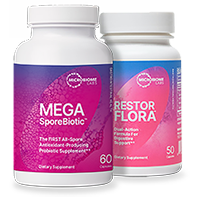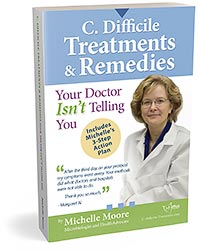Short Answer: C. diff (short for Clostridioides difficile) is a bacteria that can cause serious diarrhea and gut inflammation. You usually get it after taking antibiotics, which wipe out your healthy gut bacteria and give C. diff a chance to grow out of control.
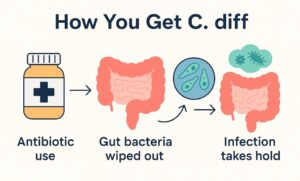
What Makes C. diff So Dangerous?
- C. diff makes toxins that damage your gut lining and trigger inflammation.
- It forms spores — kind of like microscopic seeds — that are very hard to kill and can stick around for months.
- It’s very contagious and spreads easily in hospitals, nursing homes, and even at home if surfaces aren’t cleaned properly.
How Do People Get Infected?
Most infections happen when:
- You’ve recently taken antibiotics (especially broad-spectrum ones like clindamycin, amoxicillin, or fluoroquinolones).
- You’re exposed to C. diff spores, often through contaminated hands, surfaces, or bathrooms.
- Your immune system or gut health is weakened, especially if you’re over 65 or have been hospitalized.
You can swallow C. diff spores without knowing it. They survive stomach acid and activate once they reach your colon or large intestine, especially if your healthy bacteria have been wiped out.
Common Early Symptoms
- Watery, smelly diarrhea (often multiple times a day)
- Abdominal pain or cramping
- Loss of appetite
- Nausea or low-grade fever
Symptoms usually show up 5 to 10 days after starting antibiotics, but sometimes weeks later.
Why C. diff Is Hard to Get Rid Of
- Standard antibiotics (like vancomycin) don’t kill the spores, they only suppress the live, active bacteria.
- Lingering C. diff toxins can keep inflaming the gut lining and weaken immune signals, making it easier for bad bugs, including C. diff to come back or take over again.
- Spores can reactivate later, causing relapse.
- Many people struggle with recurring infections or long-term gut problems even after treatment ends.
Natural Support That Many People Turn To
- Spore probiotics (like Bacillus strains) have been shown to work against gut pathogens and help crowd out bad bacteria. They also recondition the GI system, creating the right conditions that support a healthy gut microbiome.
- Saccharomyces boulardii helps reduce diarrhea, helps antibiotic associated diarrhea and may protect against future infections.
- Toxin binders like immunoglobulins or charcoal-based supplements help mop up C. diff toxins so your gut can start to heal.
We explain how these tools fit into a natural recovery plan on our probiotic therapies page.
Real Story from Our Community
“After a round of antibiotics, I started having horrible diarrhea and was diagnosed with C. diff. I was terrified. Nothing helped until I found this site and started on the natural protocol. I finally feel like myself again.”
— Kristian H., Indiana
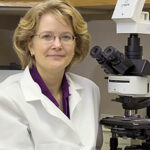
Expert Insight from Michelle Moore, Microbiologist
After working in the pharmaceutical industry and going through my own battle with antibiotic-resistant infections, I’ve seen how gut imbalances can spiral out of control. C. diff is especially tough because it involves both bacterial overgrowth and lingering toxins. Supporting the gut in the right way, with the right tools, is often the missing link to full recovery.


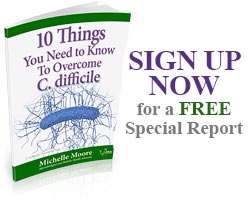 Fill in the form below to get our C. diff. tips newsletter and your free report “10 Things You Need to Know to Overcome C. difficile”.
We value your Privacy. Your email will be kept strictly confidential & secured. See our
Fill in the form below to get our C. diff. tips newsletter and your free report “10 Things You Need to Know to Overcome C. difficile”.
We value your Privacy. Your email will be kept strictly confidential & secured. See our 